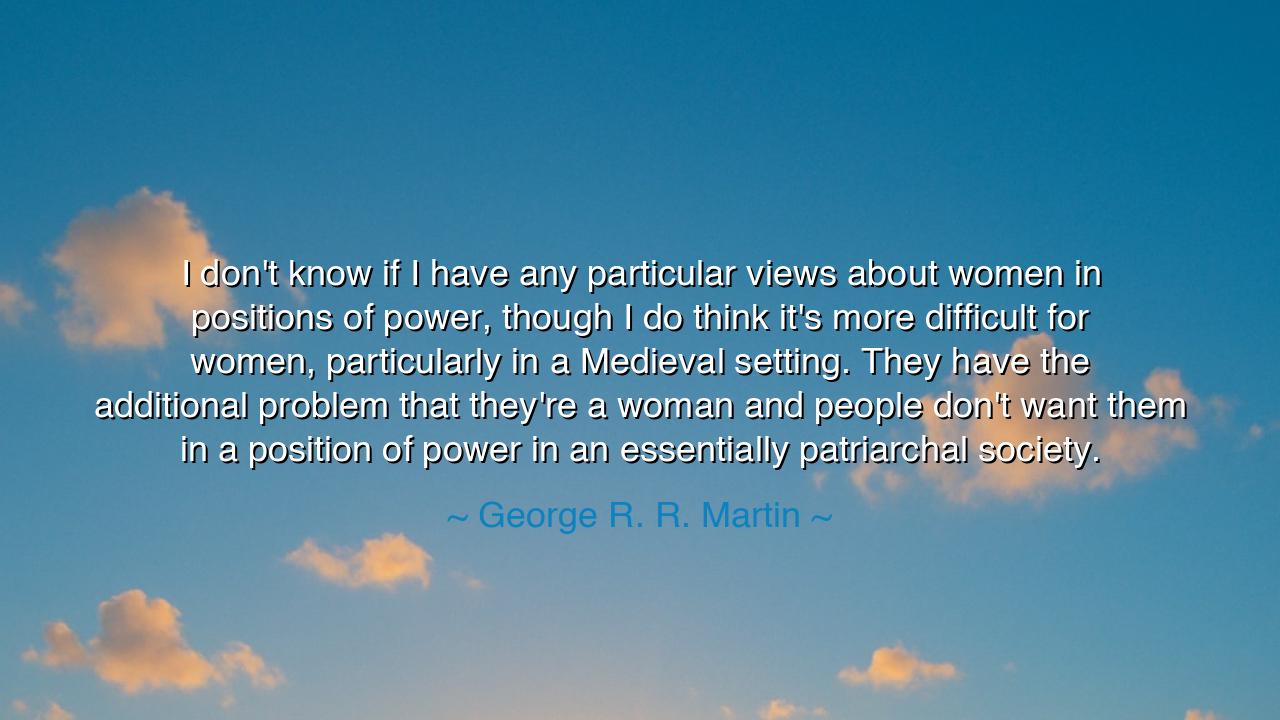
I don't know if I have any particular views about women in
I don't know if I have any particular views about women in positions of power, though I do think it's more difficult for women, particularly in a Medieval setting. They have the additional problem that they're a woman and people don't want them in a position of power in an essentially patriarchal society.






Hear now the words of George R. R. Martin, teller of sagas and forger of worlds: “I don’t know if I have any particular views about women in positions of power, though I do think it’s more difficult for women, particularly in a Medieval setting. They have the additional problem that they’re a woman and people don’t want them in a position of power in an essentially patriarchal society.” Though he spoke of fiction, his words reflect the truths of history, for behind the veil of story lies the weight of reality: that women who rise to power must fight not only their enemies, but the very world that denies their right to rule.
For in the Medieval age, as in many ages before and after, the halls of power were guarded not only by sword and law, but by custom and prejudice. A man who seized the throne was a usurper, yet a woman who sought it was deemed an abomination, her courage twisted into scandal, her ambition branded as sin. The patriarchal society proclaimed that power belonged to men by divine order, and thus the woman who dared to lead bore a double burden: to prove her strength and to overcome the suspicion that her very nature disqualified her.
Consider the tale of Empress Matilda, daughter of King Henry I of England. When her father died, she was his rightful heir. Yet the lords of the realm refused her, declaring that no woman could rule them. A bloody civil war followed, remembered as “The Anarchy,” where Matilda fought bravely but was never crowned. The throne passed instead to men, though her bloodline endured through her son, who became Henry II. Her struggle shows the truth of Martin’s words: her problem was not her lack of wisdom, nor her lack of courage, but that she was a woman in a world that denied her claim.
And yet, even in such hostile ground, some women carved their names in history. Eleanor of Aquitaine, queen of both France and England, wielded power with wit and boldness, shaping kingdoms through alliance and rebellion. Isabella of Castile, alongside Ferdinand, united Spain and sent Columbus across the seas, reshaping the destiny of the world. These women triumphed not because the patriarchal society welcomed them, but because they defied it, bearing the scorn of their age yet proving themselves greater than the men who opposed them.
The meaning of Martin’s reflection is thus clear: women in power face not only the common struggles of rule—war, politics, betrayal—but also the ancient weight of prejudice. Their victories are harder won, their failures more harshly judged, their very presence questioned by those who cling to tradition. This is not only the tale of the Middle Ages, but of many ages, for the remnants of that patriarchal vision still linger in corners of the modern world.
So what lesson shall we take? That justice demands more than granting women the chance to rule; it demands tearing down the walls of bias that make their rule more difficult than that of men. If we celebrate courage, let us celebrate it equally. If we honor wisdom, let us honor it wherever it shines. And if we seek leaders, let us judge them not by the form they were born into, but by the strength of their spirit and the goodness of their deeds.
In your own lives, O listeners, remember this: the voices silenced by prejudice may be the very voices that can guide you through storm and strife. Do not dismiss the counsel of a woman, nor question her leadership for the sake of old custom. Instead, strive to build a society where power is open to all who can bear its weight with justice. For only in such balance shall the world move closer to the harmony it was meant to hold.
Thus Martin’s words, born from stories of kings and queens, echo far beyond the realm of fiction. They are a reminder and a challenge: that the chains of patriarchy are not yet broken, but they must be, if we are ever to see a world where power belongs not to gender, but to merit, courage, and the service of the people.






AAdministratorAdministrator
Welcome, honored guests. Please leave a comment, we will respond soon